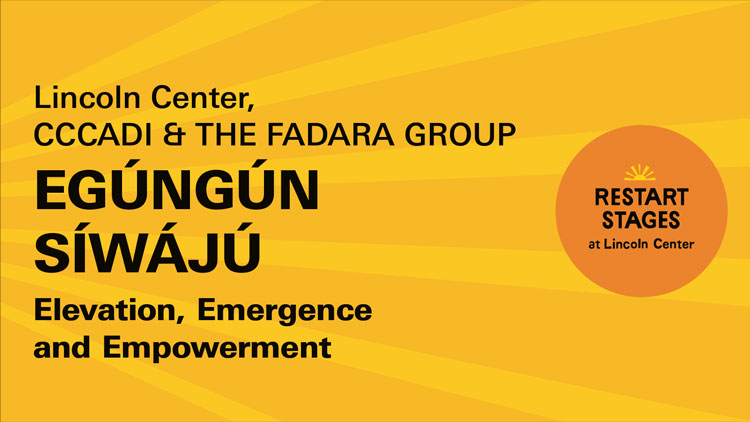Restart Stage in Damrosch Park, Lincoln Center
On July 25th, Lincoln Center, NYC, presented a very nice concert of African-Caribbean drumming and singing on its Restart Stage in Damrosch Park: Egungun Siwaju: Elevation, Emergence and Empowerment (there were two other presenters, Caribbean Cultural Center African Diaspora Institute and The Fadara Group). It was promoted as “a healing celebration of ancestral African Diasporic masking traditions.”
Five performers enter to open the show. One addresses us in an African language; another rings a small bell with a mallet. The first English words are “Spirit of the drum, support us.” The number of performers eventually grows to 15.
The purpose of the celebration, we’re told, is “to pay homage to this who’ve gone before.” That little bell is the only instrument on stage besides the drums, which vary in pitch as they’re struck and which, at their best, are complex, subtle and insistent.
The musicians gave us marvelous traditional singing. The repetitive chanting was mesmerizing. The best moments were in a call/response form — a woman calling and the male singers responding. Although this is a relatively complex form, its skillful repetition created nearly created a trance state.
We were told “The spirit of the drum is what unites us” — and it did. At one point, the audience clapped along with the drums in a complex rhythm: One — Two — Three —and — One — Two.
We were told as well that the ancestors join us “through masquerade.” And there were often one or two performers — not musicians — on stage in gorgeous, highly elaborate costumes, sometimes holding a bundle of something, or a staff or, I think, feathers. Occasionally one would bark. Sometimes they seemed to be blessing the place, but unfortunately, they usually wandered around without purpose. Was this the masking tradition referred to in the promotion, or was the drumming itself a sort of mask (some African music is referred to as mask)?
The musicians wore lively yellow and black print robes, or white robes, or short print robes with white pants. The stage picture was only marred by a couple of men in shades. But many in the audience were a delight to see in traditional print costumes.
Lincoln Center’s promotion tells us that the word “egúngún” means “ancestors”, but doesn’t tell us what the word “siwaju” means — a little research shows it, unhelpfully, to mean “ahead”. And was never clear if “Egungun Siwaju” is the name of the group or the name of the concert. The singers are singing in an African language, but we were never told what it is — the host mentions Nigeria, and the language is presumably Yoruba. And this incomprehensible language only enhanced the mystery of the songs.
We miss these explanations, but we’re told the point of the ritual: “We stand on the shoulders of this who came before us.” It was a marvelous one-hour-ten-minutes in Damrosch Park, and we thank Lincoln Center.


